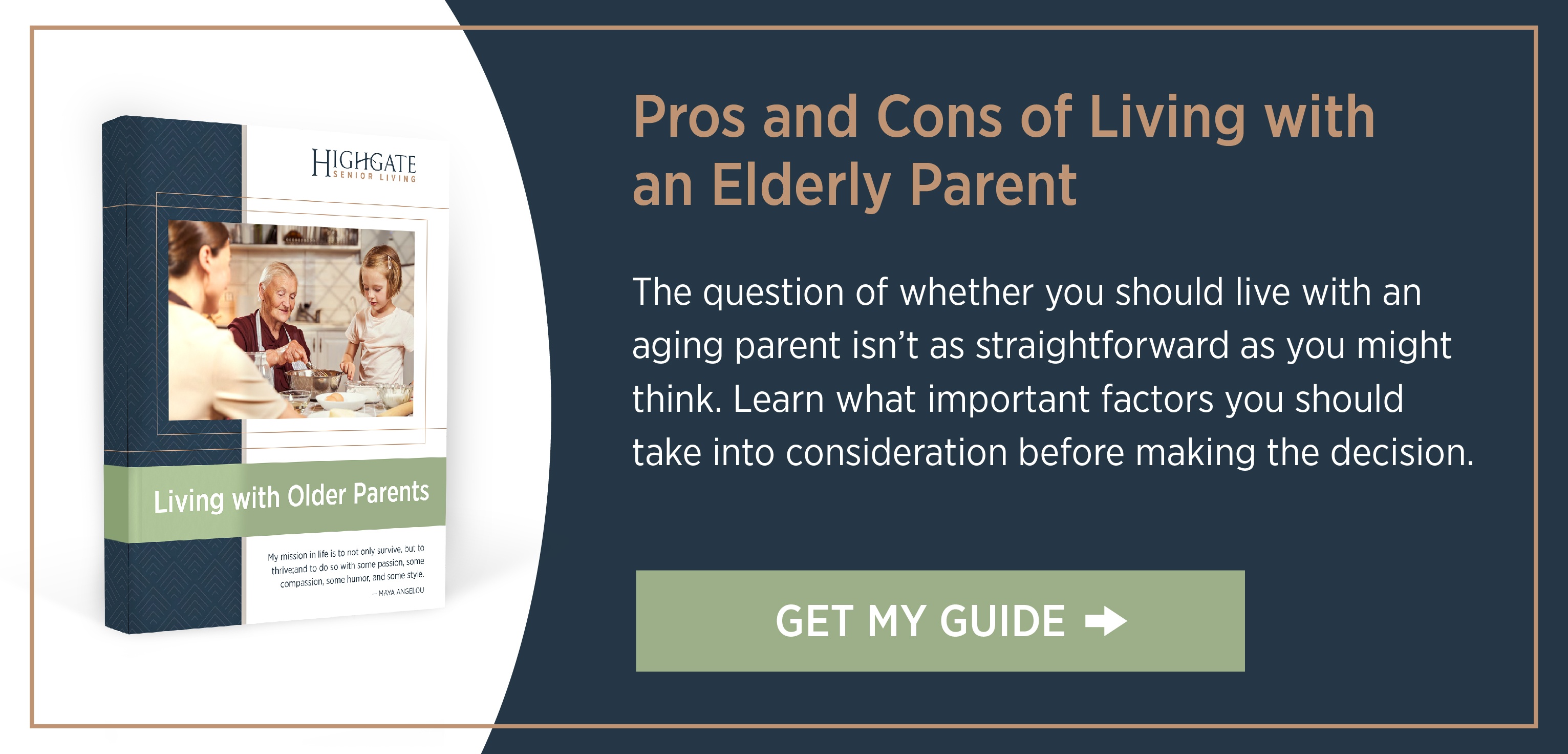
There may be many reasons why living with your aging parent isn’t going according to plan: the caregiving burden is too much for you, your spouse or your children aren’t adjusting well, your loved one’s health and happiness are at risk.
Whether your parent has actually moved in and things are not going as you expected, or you’re planning ahead and thinking about what you would do if you found yourself struggling with this situation, a lot will depend on your family’s background and the details surrounding your unique arrangement.
First, if you are in the midst of a challenging multigenerational living situation, know that you’re not alone. Many families jump right into moving in together only to face the uncomfortable ordeal of telling their parents that the arrangement isn’t working and they need to begin looking for alternative options.
If you’re feeling trapped in a situation that has gotten unsustainable for you or for your loved one, is it possible that guilt is what’s trapping you there? Caregivers often burden themselves with a long list of self-imposed oughts, shoulds, and musts. Some family caregivers are driven to live with an older parent because they want the best for them and take on too much caregiving responsibility out of a sense of obligation. When their loved one moves in, they still feel guilty — some days because they want their responsibilities as a caregiver to end, other days because they think they’re not doing a good enough job as a caregiver, spouse, or parent.
Chances are if living with your parent isn’t working for you, it’s probably not working out for them, either.
Detach with Love
It’s time to let go of the guilt. You cannot fix your loved one’s illnesses or stop them from aging. Whether you promised Mom you would always take care of her or Dad asked you to never abandon him, getting them the level of care they need means that you are taking care of them.
Sometimes professional care is necessary for the safety or comfort of your loved one and/or for you to have some life apart from caregiving. Your loved one may have more serious health conditions or need a much higher level of care than is possible for you to provide. If your health is suffering or if someone could get injured, it is time to make a change.
That doesn’t mean it’ll be easy to make the decision to put your own physical and mental health, happiness, and immediate family first. But there’s a reason why the flight attendant instructs you to put your oxygen mask on first. The fact is: If you don’t care for yourself first, you won’t be able to care for others.
Hold a Family Meeting
Have an honest conversation with your loved one if they’re able, and ask them how they feel about the arrangement. Your aging parent might not actually want to live with you: Less than a third of seniors surveyed for a Gallup & Robinson research project on aging and quality of life said they would live with a younger family member when they could no longer live on their own.
Address the challenges you’re experiencing living in a multigenerational household, and ask them about the difficulties they may be facing, as well: lack of privacy, a limited or dwindling social circle, integrating into your family life, feeling like a burden.
If your loved one is exhibiting troublesome dementia-related behaviors, include them as much as they’re able. Avoid telling your loved one they need more help. Remember, dementia affects a person’s reasoning and processing skills. If you try to convince your loved one that they have to move because they are unsafe or unable to manage their own affairs, you will only be met with resistance. For example, avoid saying something like: “We all feel that your house is no longer safe for you, and we are helping to move you to a new home.”
Explore Other Living Options
Sometimes professional care is necessary for the safety or comfort of your loved one and/or for you to have some life apart from caregiving. Research shows that moving into an assisted living or memory care community comes with quality-of-life advantages that, often, living at home cannot match. They also offer benefits that could prolong health.
Talking to a loved one about assisted living for the first time is no easy task. It’s likely to stir a wide range of emotions for you both. If you’re considering talking to your parent about assisted living, this checklist offers nine tips for navigating these difficult and emotional conversations.
It’s also not easy to talk to a loved one with dementia about a move to memory care. Your loved one may not remember things you’ve said, but they’re likely to remember how you made them feel. Read this blog for nine expert tips, based on Teepa Snow’s Positive Approach to Care, for helping a person living with dementia understand the need to move to memory care.
Still feeling guilty about the idea of moving Dad to assisted living or moving Mom to memory care? Try not to. Moving to a senior living community does not mean your loved one is abandoned: You can still spend as much time with them as you can, talk frequently with the care partners and team members, and manage their overall care. You are taking good care of your aging loved one, and you certainly have not abandoned them. Plus, you will also get to be their son or daughter or husband or wife again. You will still be your loved one’s advocate, just not their full-time caregiver.
Still Trying to Decide Whether to Move a Parent In?
Each elder and family dynamic is different, so it’s challenging to predict what setting an aging loved one would prefer and whether everyone could cohabitate well.
Don’t rush into a choice that you may later regret because of unexpected difficulties. It will be much harder to ask your parent to leave your home than it was to invite them in.
For a deeper dive into important factors to consider before cohabiting with your older parent, download our eBook Living with Older Parents. It dives deeper into the important factors to consider before cohabiting with your older parent. Before making your decision, reflect on the points and the particular circumstances of your situation. You’ll soon see the question of whether you should live with an aging parent isn’t as straightforward as you might think.






